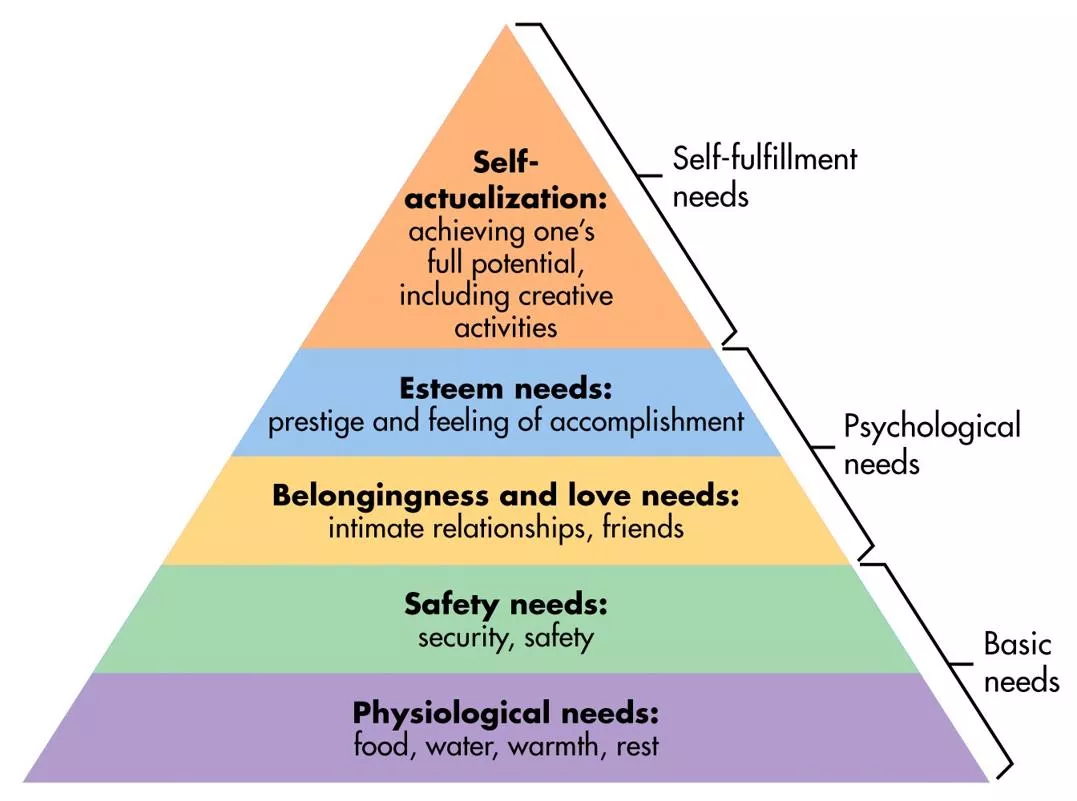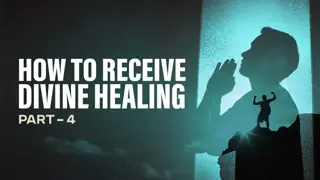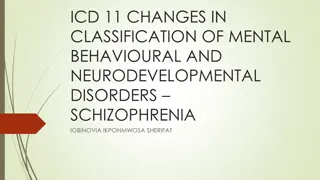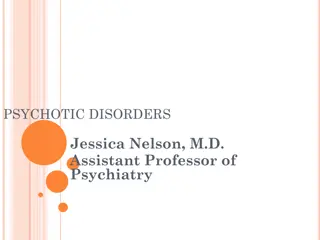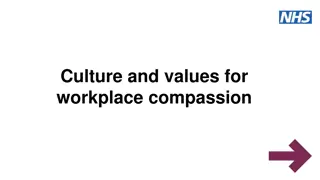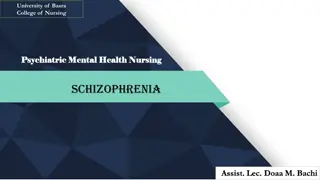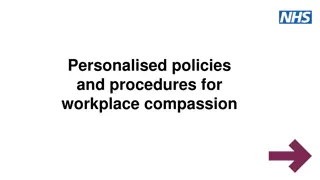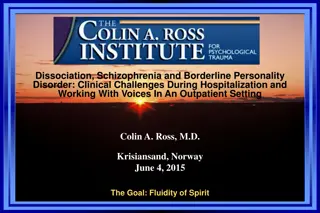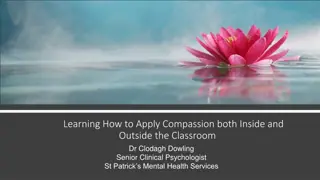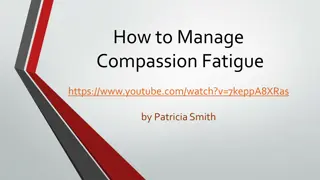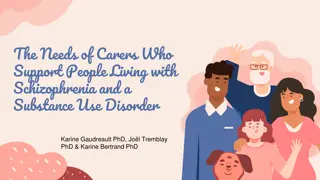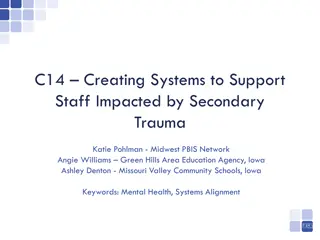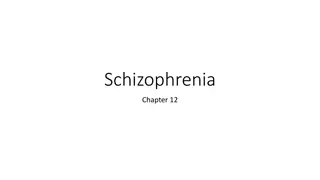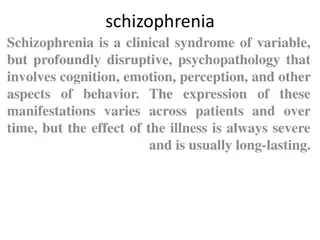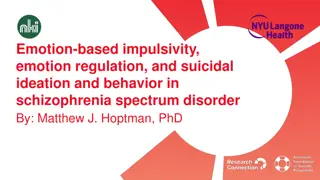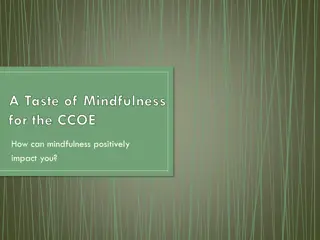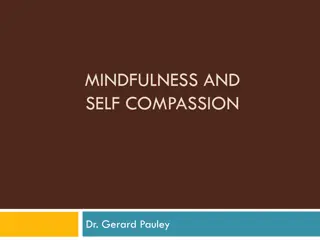Compassion in Schizophrenia: Impact and Healing
Compassion plays a crucial role in managing schizophrenia by soothing fears, reducing self-criticism and paranoia, and enhancing self-esteem and relationships. By fostering empathy and connectivity, compassion opens up avenues for emotional and relational progress, potentially aiding in self-actualization and overall well-being.
Download Presentation

Please find below an Image/Link to download the presentation.
The content on the website is provided AS IS for your information and personal use only. It may not be sold, licensed, or shared on other websites without obtaining consent from the author.If you encounter any issues during the download, it is possible that the publisher has removed the file from their server.
You are allowed to download the files provided on this website for personal or commercial use, subject to the condition that they are used lawfully. All files are the property of their respective owners.
The content on the website is provided AS IS for your information and personal use only. It may not be sold, licensed, or shared on other websites without obtaining consent from the author.
E N D
Presentation Transcript
Compassion and Schizophrenia: climbing the pyramid Mark Ellerby Expert by experience Durham
Maslow (1954) Hierarchy of needs
schizophrenia The two main symptoms of my schizophrenia are hearing critical voices and having paranoid delusions.
Impact from schizophrenia Voices, delusions, paranoia
The impact of schizophrenia on Maslow s hierarchy paranoid delusions are frightening and make us feel unsafe (Maslow s second tier) and make it difficult to trust people, which may have acted as a source of strength (third tier). hearing critical voices attacks our self esteem (Maslow s fourth tier). It is difficult to put energy into creativity when attention is pulled to threats.
Types of Affect Regulator Systems Content, safe, connected Drive, excite, vitality Non-wanting/ Affiliative focused Incentive/resource- focused Safeness-kindness Wanting, pursuing, achieving, consuming Soothing Activating Threat-focused Protection and Safety-seeking Activating/inhibiting Anger, anxiety, disgust
How can compassion help me Using the compassion in soothing the fear caused by the paranoid delusions opens up different possibilities for action and reflection. Compassion allows connectivity and empathy towards other people and should be useful for generating progress on the emotional level and relational levels. Soothing the self critical voices removes a barrier to and opens up the possibility of generating self esteem and maybe moving to the self actualisation level.
Compassionate facilitation reduction in criticism to self and paranoia Compassion helps esteem needs by reducing our self critic. Compassion helps relationhshps by reducing our fears of what others think of us.
Compassionate wards Hospital wards can hinder recovery because the patients and nurses are not sharing compassionate conversation and are left to watch the TV. less emphasis on the medical model which in effect amounts patients getting drugged on tablets instead of active and interactive. Compassionate training on the part of nurses and keeping the patients would overcome the threat system. This key to understanding this could be seen as providing more of a affiliative' atmosphere.
Family support Maintaining close family support (particularly with compassionate relatives) is a way of building emotion strength against voices and delusions but also helps develop the emotional tier of the maslow tree in profound ways. if family contract is restricted by wards this is going to be more difficult.
Accommodation Sheltered Accommodation is just that ie Sheltered and is possible to contribute to the safety needs of service users.
Day services Day centres are places where people can talk to each other and develop compassion through witnessing each others suffering. From here friendships and relationships can develop strengthening the emotional level of the tree still further while compassion may give patients the emotional strength to support work and independent living outside the mental health system which is the ultimate aim of such places. For Gilberts therapy it was important to expand our emotional and achievement circles to help overcome or soothe the threat system. I think the courses on offer at day centres and making friends there in safe non stigmatising environment will help further overcome the threat circle and help us climb the Maslow tree
Esteem Kristen Neff found that self esteem, Maslows fourth tier, depends a lot on our position in society and how far up we are in the social hierarchy. This is going to be particularly problematic for mental health patients because few of them have the opportunity to work. They also experience stigma, external shame and isolation from others.
Stress-vulnerability we all have different thresholds for stress and how vulnerable we are to be tipped over the edge. It is useful to know what the triggers are and how to build resilience. I am learning mindfulness, breathwork, to use an image of me at my best, to rebuild friendships, to have courage to go out of the house. I am learning to change the relationship to my voices so I am less submissive that is a challenge!
Issues with maslow Erickson argues that it is possible to climb the maslow tree without having to do it level by level. So it may be possible to get some self esteem or emotion level even when frightened.
I have noticed. when I eventually calm down, I return to a normal emotional state and go from threat to safeness . and vice versa when frightened. this seems to point to the fact that climbing the Maslow tree may be possible with schizophrenia Compassionate support from services and family will help this journey. CFT has given me some hope.



